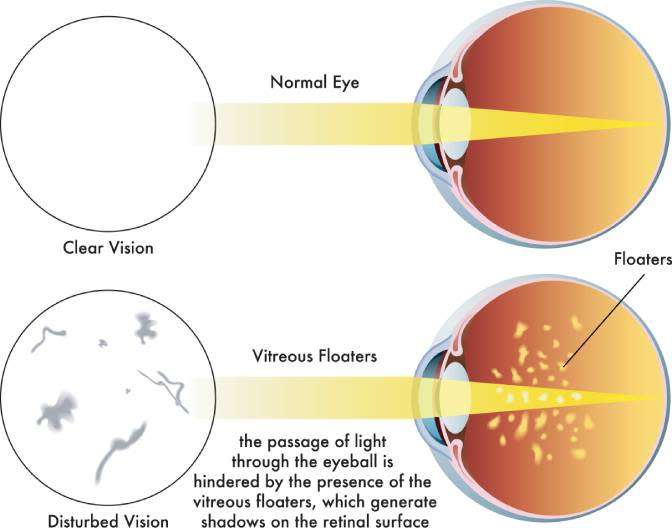Buy One, Get One 50% OFF Eyeglasses
* Restrictions apply. Ask a Team Member for details.
Schedule An Appointment Today

Schedule An Appointment Today
Eye floaters are small spots in your vision that may drift about when you move your eyes. They can also dart away when you look at them directly, making them hard to fully see.
Eye floaters are usually caused by age-related changes in the eyes, and often disappear on their own in weeks or months.
Eye floaters don’t always require treatment, but are still important to be examined. Floaters can impair your vision and be a symptom of an underlying health condition.
eyecarecenter’s team of eye doctors specialize in diagnosing and treating eye floaters. Our goal is to grant you peace of mind and restore your field of vision.

Eye Floater Treatments from eyecarecenter in North Carolina
At eyecarecenter, our goal is to provide every patient with the best vision possible. We are conveniently located throughout North Carolina. Find us in Charlotte, Raleigh, Durham, Winston-Salem, and other towns throughout the Tar Heel State.
Eye Floater Symptoms
Common symptoms of eye floaters are seeing shapes in your vision. These shapes may appear as specks, strings, or spots that move when you move your eyes.
Eye floaters are most noticeable when you’re looking at a plain background but may move when you try to focus on them.
When Should You See an Eye Doctor About Eye Floaters?
As mentioned earlier, not all eye floaters require treatment.
However, you should contact your eye doctor if you experience any of these symptoms:
Peripheral vision loss, or loss of side vision caused by floaters
Impaired vision
More floaters than usual
Sudden onset of new eye floaters
Seeing flashes of light in the same eye as the floaters
How Does an Eye Doctor Diagnose Eye Floaters?
eyecarecenter’s eye care professionals use a tool called an ophthalmoscope to examine the central and peripheral retina. The ophthalmoscope allows us to detect floaters or flashes in your vision.
The eye doctor may ask to dilate your eyes during your eye exam. This lets them get a better look at the inside of your eye by enlarging the pupil, the black hole in the center of your eye.
After getting your eyes dilated, your eye doctor will examine the eye for floaters and take a closer look at the retina.

Eye Floater Treatment Options at eyecarecenter
After examining your eye, the eye doctor may say that time is the best treatment for your condition. This is because eye floaters are commonly just an effect of aging and often go away on their own.
If your eye floaters are impairing your vision, your eye doctor may suggest undergoing a vitrectomy. A vitrectomy is an eye surgery that removes the vitreous material from the eye through a small incision. This vitreous material is what causes you to see eye floaters.
Laser therapy is another treatment option for those with vision-impairing eye floaters.
If you are experiencing eye floaters, our team of expert optometrists will work with you to develop a treatment plan customized to your condition.
Frequently Asked Questions About Eye Floaters
Anyone can develop eye floaters. Those with an increased risk of developing this condition are:
45 years of age or older
Nearsighted
Have previously undergone a cataract operation
Have had laser surgery
Most eye floaters go away over time without treatment, but some can be more persistent.
Some eye floaters can disappear within a few weeks, but sometimes they can take up to several months to go away. You may notice that your floaters may get smaller and less noticeable over time.
By themselves, floaters will not make you go blind.
However, it’s important to remember that floaters can be a symptom of more serious vision conditions such as diabetic retinopathy or retinal detachment. If not diagnosed or treated properly, these eye conditions could lead to blindness.